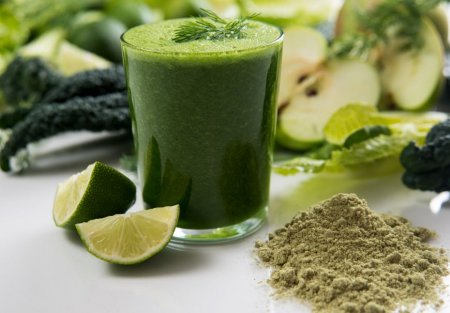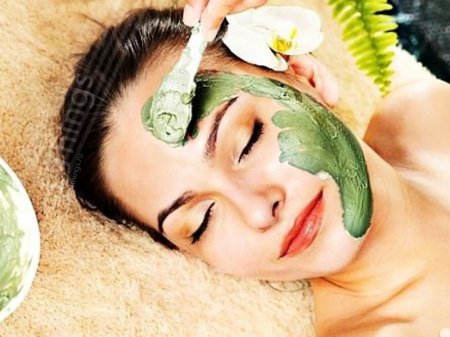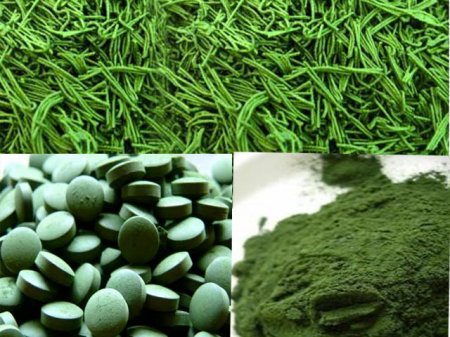Spirulina - benefit, harm, properties and applications
Spirulina - what is it, the use of
As with chia seeds, the first people who started using spirulina were the Aztecs. In the Americas and Africa, people consumed spirulina in the diet for centuries, but the study of composition and properties of this product began only 30 years ago.
One of the oldest forms of life on our planet, spirulina over millions of years has not changed and evolved as the other organisms. All because it is quite unique and can exist in different conditions without changing completely.
Spirulina has a dark green color, and even looks like a seaweed, is actually a living organism. It is found in the waters of the ocean and in lakes.
Primarily, spirulina used as a source of dietary protein, iron and B vitamins
Composition:
Proteins - 65% of dry weight;
Amino acids;
B vitamins;
The minerals calcium, iron, zinc, phosphorus, magnesium, potassium;
Vitamins: A, C, D, E, riboflavin, thiamine;
Antioxidants.
Spirulina is the only source of powerful antioxidant fitotsianina.
Calorie. At 100 grams of product account for about 300 calories. Some would say that's a lot, but spirulina take a maximum of 1-2 tablespoons, so the number of calories is no need to worry.
Forms of spirulina
In nature, there are many types of spirulina, but the man used only 2. The sale of spirulina can be found in the form of tablets, powder and flakes.
Application
Except as supplements to the human diet, spirulina also added to the feed in fish farming and animal.
Spirulina powder used in cosmetology. From it makes a variety of masks to rejuvenate and nourish the skin of the face.
Due to resistant pigments, spirulina extract is often used in the food industry as a natural dye.
Useful properties of spirulina
Today, Spirulina is one of the natural resources and affordable anti-aging because it has a powerful antioxidant effect.
Of the total weight of spirulina about 65 is easily digestible protein which includes almost all essential amino acids;
Spirulina contains unsaturated omega 3, 6 and 9;
Due to the presence of chlorophyll helps to cleanse the blood of toxins and strengthen the immune system;
The high content of easily digestible iron does Spirulina benefit agent in the treatment of anemia;
It improves vision and useful for eye health in general;
It has anti-inflammatory properties;
It stimulates cell regeneration, so widely used in cosmetics;
Displays toxins;
Increases immunity;
It improves the sexual life of women and men;
Regular intake of spirulina helps relieve the symptoms of many types of allergies, such as allergies to pollen that torments many people in the spring;
It lowers cholesterol, regulates blood pressure;
It inhibits the development of tumor cells, preventing many types of cancer;
Improves memory;
Good for health of the cardiovascular system;
Reproaches metabolism;
It revitalizes the skin from the inside. It is used for acne and dermatitis;
It gives energy charge;
It improves digestion.
Spirulina Facial
In cosmetology, spirulina powder is used to make a variety of face masks, and spirulina extract can be found in creams for the face.
The simplest mask is spirulina powder with a small amount of warm water. For dry skin, add egg yolk, olive oil. If skin is oily, it is suitable ingredients lemon juice, honey. To enhance the anti-aging effect in the mask with spirulina added oil or sea buckthorn juice, nettle, vitamins A and E in the oil.
Spirulina tablets as a supplement
How to use? 1 tablet 3 times a day for half an hour before meals. It is believed that if you take spirulina after a meal, it contributes to weight gain, as if before a meal - that losing weight because it reduces appetite.
The usual course of taking spirulina lasts 1-3 months, followed by a pause of 1 month.
Does really spirulina?
Many scientists argue that is not enough scientific evidence that spirulina can treat the disease, which some assert. However, there is no denying the fact that this product is very rich in nutrients. According to the Office for sanitary inspection of the quality of medicines USA, Spirulina contains a lot of calcium, niacin, potassium, magnesium, B vitamins and iron and amino acids.
Doctors and experts on nutrition agree that spirulina, like other so-called "super-food" there is one problem: Everyone knows that they are rich in nutrients but how good or bad these nutrients absorbed by the body, is not known.
The body's ability to assimilate certain substances is a very important aspect. For example, leucine is contained in tomato is much better absorbed when it is tomatoes with oil, calcium is absorbed in the presence of vitamin D, and it is not the only condition.
Does spirulina to lose weight?
It is believed that the evidence that spirulina helps to lose weight is not enough. There is no dispute that this is a useful supplement, but, unfortunately, have to rely only on feedback from consumers or from their own experience.
Whatever it was, to lose weight without adjusting the power or changing lifestyle more active, you can not. There are no miracle supplements that will neutralize all harm from the consumption of sausages with artificial flavors and carcinogenicity, toxicity of smoked meat or a lack of vitamins and minerals due to the abundance of starchy foods in the diet. Additives may only be a help, an assistant, but did not answer all the questions.
The importance of choosing quality spirulina
According to doctors, spirulina quite safe product, however, under certain conditions of production and collection, it may be infected with various pathogenic bacteria and toxins. Also, there are cases when spirulina supplements found traces of toxic metals. This poor quality spirulina may harm the health of the liver, most often symptoms such as nausea and vomiting, thirst, weakness. That is why we recommend to carefully choose the manufacturer and make sure that the product is tested and tested in different conditions.
A lot of spirulina on the market today that comes from China, but we must not forget about the environmental situation in the country. Perhaps there are manufacturers who care about the quality and sustainability of the product, but we do not know whether this really is. A good, quality product that is grown without the use of chemicals in an ecologically clean area.
Contraindications and harm spirulina
People with autoimmune diseases should avoid taking supplements and medicines containing spirulina. Since spirulina enhances the function of protecting the body (immune system), it may worsen the symptoms of multiple sclerosis, lupus, rheumatoid arthritis and other diseases associated with hyperactivity of the immune system.
For the same reasons, Spirulina can weaken the effect of immunosuppressive drugs are often used to treat autoimmune diseases and to prevent the body from organ transplant repulsion.
Spirulina should not be taken simultaneously with anticoagulants, and it is not recommended to combine both products and herbs that also reduce blood clotting (such as ginger, garlic, turmeric, ginseng).
Since research on the safety of receiving spirulina pregnant women and children, doctors recommend to avoid this supplement to the corresponding periods of life.
As with chia seeds, the first people who started using spirulina were the Aztecs. In the Americas and Africa, people consumed spirulina in the diet for centuries, but the study of composition and properties of this product began only 30 years ago.
One of the oldest forms of life on our planet, spirulina over millions of years has not changed and evolved as the other organisms. All because it is quite unique and can exist in different conditions without changing completely.
Spirulina has a dark green color, and even looks like a seaweed, is actually a living organism. It is found in the waters of the ocean and in lakes.
Primarily, spirulina used as a source of dietary protein, iron and B vitamins
Composition:
Proteins - 65% of dry weight;
Amino acids;
B vitamins;
The minerals calcium, iron, zinc, phosphorus, magnesium, potassium;
Vitamins: A, C, D, E, riboflavin, thiamine;
Antioxidants.
Spirulina is the only source of powerful antioxidant fitotsianina.
Calorie. At 100 grams of product account for about 300 calories. Some would say that's a lot, but spirulina take a maximum of 1-2 tablespoons, so the number of calories is no need to worry.
Forms of spirulina
In nature, there are many types of spirulina, but the man used only 2. The sale of spirulina can be found in the form of tablets, powder and flakes.
Application
Except as supplements to the human diet, spirulina also added to the feed in fish farming and animal.
Spirulina powder used in cosmetology. From it makes a variety of masks to rejuvenate and nourish the skin of the face.
Due to resistant pigments, spirulina extract is often used in the food industry as a natural dye.
Useful properties of spirulina
Today, Spirulina is one of the natural resources and affordable anti-aging because it has a powerful antioxidant effect.
Of the total weight of spirulina about 65 is easily digestible protein which includes almost all essential amino acids;
Spirulina contains unsaturated omega 3, 6 and 9;
Due to the presence of chlorophyll helps to cleanse the blood of toxins and strengthen the immune system;
The high content of easily digestible iron does Spirulina benefit agent in the treatment of anemia;
It improves vision and useful for eye health in general;
It has anti-inflammatory properties;
It stimulates cell regeneration, so widely used in cosmetics;
Displays toxins;
Increases immunity;
It improves the sexual life of women and men;
Regular intake of spirulina helps relieve the symptoms of many types of allergies, such as allergies to pollen that torments many people in the spring;
It lowers cholesterol, regulates blood pressure;
It inhibits the development of tumor cells, preventing many types of cancer;
Improves memory;
Good for health of the cardiovascular system;
Reproaches metabolism;
It revitalizes the skin from the inside. It is used for acne and dermatitis;
It gives energy charge;
It improves digestion.
Spirulina Facial
In cosmetology, spirulina powder is used to make a variety of face masks, and spirulina extract can be found in creams for the face.
The simplest mask is spirulina powder with a small amount of warm water. For dry skin, add egg yolk, olive oil. If skin is oily, it is suitable ingredients lemon juice, honey. To enhance the anti-aging effect in the mask with spirulina added oil or sea buckthorn juice, nettle, vitamins A and E in the oil.
Spirulina tablets as a supplement
How to use? 1 tablet 3 times a day for half an hour before meals. It is believed that if you take spirulina after a meal, it contributes to weight gain, as if before a meal - that losing weight because it reduces appetite.
The usual course of taking spirulina lasts 1-3 months, followed by a pause of 1 month.
Does really spirulina?
Many scientists argue that is not enough scientific evidence that spirulina can treat the disease, which some assert. However, there is no denying the fact that this product is very rich in nutrients. According to the Office for sanitary inspection of the quality of medicines USA, Spirulina contains a lot of calcium, niacin, potassium, magnesium, B vitamins and iron and amino acids.
Doctors and experts on nutrition agree that spirulina, like other so-called "super-food" there is one problem: Everyone knows that they are rich in nutrients but how good or bad these nutrients absorbed by the body, is not known.
The body's ability to assimilate certain substances is a very important aspect. For example, leucine is contained in tomato is much better absorbed when it is tomatoes with oil, calcium is absorbed in the presence of vitamin D, and it is not the only condition.
Does spirulina to lose weight?
It is believed that the evidence that spirulina helps to lose weight is not enough. There is no dispute that this is a useful supplement, but, unfortunately, have to rely only on feedback from consumers or from their own experience.
Whatever it was, to lose weight without adjusting the power or changing lifestyle more active, you can not. There are no miracle supplements that will neutralize all harm from the consumption of sausages with artificial flavors and carcinogenicity, toxicity of smoked meat or a lack of vitamins and minerals due to the abundance of starchy foods in the diet. Additives may only be a help, an assistant, but did not answer all the questions.
The importance of choosing quality spirulina
According to doctors, spirulina quite safe product, however, under certain conditions of production and collection, it may be infected with various pathogenic bacteria and toxins. Also, there are cases when spirulina supplements found traces of toxic metals. This poor quality spirulina may harm the health of the liver, most often symptoms such as nausea and vomiting, thirst, weakness. That is why we recommend to carefully choose the manufacturer and make sure that the product is tested and tested in different conditions.
A lot of spirulina on the market today that comes from China, but we must not forget about the environmental situation in the country. Perhaps there are manufacturers who care about the quality and sustainability of the product, but we do not know whether this really is. A good, quality product that is grown without the use of chemicals in an ecologically clean area.
Contraindications and harm spirulina
People with autoimmune diseases should avoid taking supplements and medicines containing spirulina. Since spirulina enhances the function of protecting the body (immune system), it may worsen the symptoms of multiple sclerosis, lupus, rheumatoid arthritis and other diseases associated with hyperactivity of the immune system.
For the same reasons, Spirulina can weaken the effect of immunosuppressive drugs are often used to treat autoimmune diseases and to prevent the body from organ transplant repulsion.
Spirulina should not be taken simultaneously with anticoagulants, and it is not recommended to combine both products and herbs that also reduce blood clotting (such as ginger, garlic, turmeric, ginseng).
Since research on the safety of receiving spirulina pregnant women and children, doctors recommend to avoid this supplement to the corresponding periods of life.


